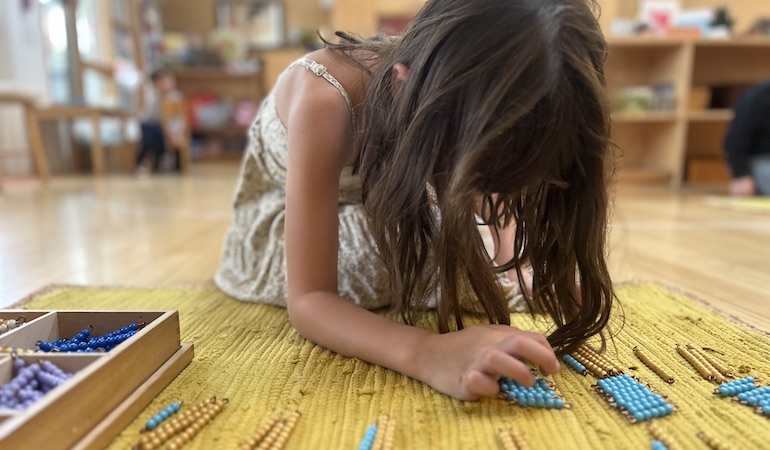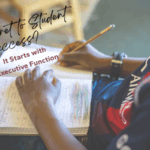As an experienced Primary Guide and a parent myself, I understand parents’ desire for educational paths that not only provide academic excellence but also nurture essential life skills. This is where the Montessori method, with its century-old roots, aligns beautifully with both current aspirations and traditional educational values.
The Philosophy Behind Montessori’s Three-Year Cycles
Our Montessori education is thoughtfully structured around three-year cycles, a design deeply rooted in Dr. Maria Montessori’s understanding of child development. She once wrote, “I have found that in their development, the child passes through certain phases, each of which has its own particular needs. The characteristics of each are so different that the passages from one phase to the other have been described by certain psychologists as ‘rebirths.’ I’ve seen firsthand the wisdom in that observation.
Montessori’s three-year cycles are critical for several reasons:
- Developmental Synchronization: Each cycle corresponds with a child’s natural developmental stages, offering an education that is harmoniously aligned with their growth.
- Continuity and Stability: These stages of development have specific age-appropriate needs, tendencies, preferences, and mentalities that are observable. Since we know what they are we can then meet the child’s needs on all these fronts by providing a specifically prepared and tailored learning environment. It is a prepared space that is consistent and stable in expectations, freedoms, limits, and learning opportunities. This is crucial for children to build meaningful relationships and feel secure while becoming brave in setting learning goals.
- Building Upon Foundations: In each year of the Primary program, children build upon their previous learning, culminating in the final year where they master and apply their accumulated knowledge. Notably, no time is lost as children return to their familiar space and community. They jump right back into the strong curriculum and have the confidence to take risks and make big strides in their learning.
- Mixed-Age Grouping: This approach fosters learning from peers of different ages, nurturing leadership qualities in older students and solidifying their learning.
- Personalized Learning Journey: Across these multiple years together, we, as educators, tailor the learning experience to each child’s unique needs, ensuring a comprehensive and individualized educational journey that capitalizes on unique interests and skills while addressing areas for growth too
Why Completing the Cycle Matters
Completing the full cycle in a Montessori setting is essential. It’s in the final year that the child’s learning, confidence, and social skills reach their peak. This year is about coalescing all the earlier learnings and bringing them together for transformation and mastery.
- From Curiosity to Mastery: In the first two years, children engage in foundational activities that lay the groundwork for more complex skills. For instance, Primary students may practice polishing or button sewing, which indirectly prepares them for cursive handwriting. They also work on building words and playing sound games, essential for developing fluent reading and creative writing skills. By the final year, these foundational experiences evolve into a deeper understanding and mastery, where children apply and extend their skills in more sophisticated ways. Interdisciplinary work takes off; for example, a child might trace a puzzle map and label it. They could go on to do several maps and even complete a set of all the continent maps if inspired to do so.
- Leadership and Social Skills: Now, as the oldest in the classroom, they become role models and mentors, enhancing their empathy, responsibility, and social skills – preparing them for collaborative and leadership roles in the future.
- Beyond Academics: The Montessori method ensures that children develop essential life skills through their academic work. Final year children also tackle progressively longer tasks: they may create a multiplication booklet or illustrate and author their own stories and books. They are taking one subject and applying many skills to it.
- They dive deep! A child deeply interested in a subject can be channeled in a variety of ways. For example, through a botany lesson, the child may explore leaf shapes and then transfer that understanding to local and native plants in the area. They then may be interested in taking it to the outside environment or our local hikes on Ring Mountain to identify the plants about which they have learned.





Choosing Montessori’s Third Year Over Conventional Kindergarten: A Crucial Decision
As parents evaluate educational choices for kindergarten, it’s important to consider the unique benefits of continuing for the final year in a Montessori Program for ‘kindergarten’ compared to transitioning to a conventional kindergarten program.
- Depth of Learning vs. Breadth of Curriculum: Conventional kindergarten programs may offer a broad, general curriculum, but Montessori’s third year provides an opportunity for deep learning, solidifying the most robust understanding of concepts.
- Self-Directed Learning: In contrast with the more limited, adult-centered conventional school environments, Montessori’s self-directed learning approach empowers children, fostering their independence and a genuine love of learning. Five-year-olds know how they best learn and even develop passions for topics ranging from animals to plants and scientific concepts that they can explore for their literacy and math lessons.
- Social and Emotional Development: As a final year primary child leadership skills and self-confidence coalesce. In the prepared environment this final year child experiences learning all of the lessons they have longed for and seen older peers working with. Now it is their turn! They dive in with vigor to explore the next level of challenge and make exciting discoveries about their capacity to read, write, and memorize essential math facts. Becoming good at doing things leads them to feeling true self-confidence and accomplishment.
- Consistency and Community: Research validates the potent value for children of learning for multiple years with the same educator. Staying in their familiar environment offers children continuity, benefiting the child’s sense of security and community belonging.
Like puzzle pieces, each year in the Montessori program builds towards this final year, where a complete picture of the child’s preparedness and growth becomes suddenly and powerfully visible.
Beyond Academics: The MMS Full Cycle Program Experience
In addition to the rich academic and developmental journey in our Montessori setting, the MMS Full Cycle Program includes several unique experiences that further enhance growth in their final year:
- Guidance and Role Adjustment: At the start of the school year, we hold special meetings with final-year children and their guides to discuss their evolving roles in the classroom. This helps them understand and embrace their new responsibilities as leaders, mentors, and positive examples.
- Physical Education and Group Activities: Recognizing the importance of physical development and teamwork, children attend P.E. classes weekly during playtime. These sessions are designed to level up their group activity skills and individual gross motor abilities. They interact with all the children in their final year of Primary and explore peer connections across our four primary communities.
- Exploration Beyond the Classroom: Experiential learning is a key component of our program. Activities like Ring Mountain Hikes and Field Trips, specifically for our 5 and 6-year-olds, provide hands-on learning experiences that connect classroom lessons with life in local communities.
- Celebrating Milestones: The final year includes a special “stepping-up” event. This ceremony is not just a celebration but a significant acknowledgment of each child’s achievements and readiness for the next stage in their educational journey.
- Comprehensive Progress Reports: Families receive an end-of-year report detailing their child’s academic, social, and emotional progress. These reports offer insights into the child’s development and achievements throughout the year.
The Importance of the Foundation: Empowering Your Child for a Complex Future
Deciding to complete the full Primary Montessori cycle is a decision to equip your child with the tools necessary for a complex and rapidly changing world. It’s an investment in their ability to think critically, act empathetically, and lead confidently.
Time and again, I’ve witnessed the profound impact of completing this full cycle. Children in their final Primary ‘kindergarten’ year become confident leaders and remain curious learners who are compassionate and ready for the future’s challenges and opportunities.

Since 2006, Cheryl has been guiding Marin Montessori primary children, supporting both children and their parents in best practices for independence and healthy child development. She earned a bachelor’s degree in sociology from the University of California, Santa Barbara, and earned her AMI Primary Diploma in San Diego. In addition to those credentials, she also holds a Master’s in Education from Loyola College in Maryland. At home, Cheryl is a Montessori parent to two young children.





